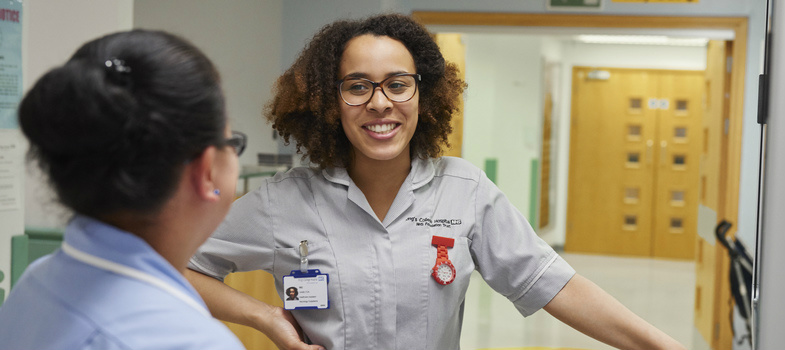1.9 How does Parkinson’s progress?
Parkinson’s is often described as having four stages (also referred to as ‘phases’): diagnosis, maintenance, advanced (often called the ‘complex phase’) and palliative.
The progression of Parkinson’s is not always a straightforward process. Sometimes, if a person’s medication is reviewed and they begin to receive more appropriate treatment, it is possible for their condition to revert from the advanced to the maintenance stage.
Look at the animation below, which lists the stages of Parkinson’s. This shows the average number of people in a particular stage at any one time, the average length of each stage and examples of the care required at each stage. Remember that these numbers are averages and so not everyone will spend the same length of time in any one of the stages.
The animation suggests a linear path through a series of stages. In real life, people are unlikely to progress through each stage one after the other – particularly around the maintenance and advanced stages, where the effectiveness of medication can alter people’s experiences.
(The animation is also available as a PDF file [Tip: hold Ctrl and click a link to open it in a new tab. (Hide tip)] or online.)
You can download this resource and view it offline. It may be useful as part of a group activity.
Diagnosis
This stage refers to the point when the person receives their diagnosis. The information and support a person receives at this time is very important. A person diagnosed with Parkinson’s should be provided with all the information they need to help them to adjust to life with the condition. Parkinson’s UK offers a range of support to people with Parkinson's, at all stages of the condition. This includes answering questions through their helpline or providing health information on the condition.
Being diagnosed with Parkinson’s can be an emotional experience and everyone will react to the news in their own way. Not everyone will want a lot of information or detail about Parkinson’s straight away. But it is very important that they know where to access more information and support when they are ready for it.
You can help people with Parkinson’s by signposting them to Parkinson’s UK.
Think about your own experiences either personal or professional. How might you feel at this point?
The appropriate process for diagnosis is discussed in Section 1.8. The NICE guideline recommends that if a GP suspects that a person has Parkinson’s, they should be referred untreated to a specialist in movement disorders before any treatment is considered. This can be a neurologist or elderly care physician.
Not everyone will immediately be prescribed medication at the point of diagnosis. If symptoms are mild, some people, together with their specialist, may decide to postpone drug treatment until their symptoms increase.
Further information and links to the NICE guideline can be found on the Parkinson’s UK website.
Maintenance
By this stage, a person’s symptoms will have increased significantly. Most people will be on a medication regime to control their symptoms. A person’s condition and medication regime should be reviewed every six months to make sure that they have the best quality of life possible.
Advanced (complex phase)
In this course, we will focus on advanced Parkinson’s as this is the point when you are most likely to come into contact with a person with Parkinson’s in your workplace. Although there is no specific definition of what advanced Parkinson’s is, it usually refers to when Parkinson’s symptoms begin to significantly affect a person’s everyday life. It is not to do with a person’s age or how long they have had the condition.
It may also be a time when Parkinson’s drugs are less effective at managing a person’s symptoms, or side effects are outweighing benefits. A person may also have a more complex drug regime which may need to be altered frequently to meet the changing nature of the condition.
At this stage, people will be likely to have less independence and need help with activities of daily living. This is because the condition is less controlled as treatment becomes less effective. It is likely that many people with Parkinson’s will feel they have to give up a number of hobbies or leisure activities that they have previously enjoyed. However, evidence shows that exercise and keeping moving is important at all stages of the condition and helps with day-to-day activities when symptoms are advanced. This could be as simple as chair-based exercises, muscle stretches or mental effort too. The Parkinson’s exercise framework has more information on this which you can use to encourage people with Parkinson’s to stay as active as they can.
Although the condition progresses differently and at a different speed for each person, the advanced stage can potentially cover a long period of time.
Someone with advanced Parkinson’s may experience the following:
- drug treatments that are no longer effective
- a complex drug regime
- more ‘off’ periods (times before the next dose of medication when symptoms are not well controlled) and dyskinesia
- increased mobility problems and falls
- problems with swallowing
- mental health symptoms such as depression, anxiety, hallucinations and delusions, and dementia
- reduced independence
- less control of Parkinson’s symptoms, which become less predictable.
Some people experience pain as a main symptom of Parkinson’s and this becomes more likely in the advanced stages of the condition. So at this stage, management of pain is crucial.
Because of the range of symptoms and the increase in their care needs, it is important that people with Parkinson’s have access to a multidisciplinary team of healthcare professionals. This will include their specialist, Parkinson’s nurse, physiotherapist, occupational therapist, speech and language therapist, continence nurse and dietitian.
A person with Parkinson’s may also need access to other services, such as counselling, social services, falls services, respite care and day care at home.
As a health or social care professional, you are a key part of this team. You may have people with Parkinson’s referred to you, or your role may be to monitor the condition on a regular basis and raise any issues with your manager, who can alert the relevant healthcare professional.
Different members of the multidisciplinary team should also be able to advise you on any relevant care points. These may include swallowing techniques, posture and different diet options if someone has problems eating; equipment that may help with mobility; and strategies to help someone who is experiencing hallucinations, delusions or anxiety.
Drawing on your own experiences, either from your professional observations or personal life, write 200 words in your reflection log to describe the possible physical, emotional and social impacts of this stages on a person’s life.
Palliative (end of life)
In the palliative stage, the major challenge is to achieve the best quality of life and maintain a person’s dignity. Appropriate pain control and support services should be in place.
A person in this stage of their condition may need regular reviews of their medication. Many people may need to stop taking some medications because of an increased sensitivity to side effects or because they are not working as well as they used to. Some people may also be unable to take medication orally.
A local Parkinson’s nurse or the person’s specialist can provide advice about how this period should be appropriately managed.
Although the condition progresses differently and at a different speed for each person, the palliative stage can potentially cover a long period of time. Some of the more advanced symptoms can lead to increased disability and poor health. This can make someone more vulnerable to infection. People with Parkinson’s most often die because of an infection or another condition.
The care plan of someone with Parkinson’s should include details of their wishes for end of life. This will include who they want to be with them, any spiritual or religious needs, and where they want to be when they are dying. This may or may not be where they currently live.
For more information around delivering services, care and support at the palliative stage, please read the NICE guideline (NG142) End of life care for adults: service delivery, as well as looking at the Quality standard (QS13) End of life care for adults.
Care plan action
It is important that you find out whether your resident or client has a care plan in place regarding their preferences for how the issues surrounding advanced Parkinson’s should be managed. This should include legal documentation, such as a Power of Attorney and an advance decision (also known as an Advanced Directive or Advance Decision to Refuse Treatment and Living Will). This care plan should also include information about palliative care and the person’s wishes for end of life.
The NICE guideline for Parkinson’s disease in adults recommends that opportunities to discuss information on prognosis of Parkinson’s should be made available early on and should focus on shared decisions with the patient and their family. You should also consider that the person with Parkinson’s will need different information from their family member or carer.
If a person does not have a care plan in place, you should help them to develop one. This should be in discussion with the person, their carer and family members (if relevant).
We have information that gives people with Parkinson’s more detail about preparing for the practical and emotional aspects of death and dying.
Read more in our booklet on preparing for end of life.
1.8 How is Parkinson’s diagnosed?

